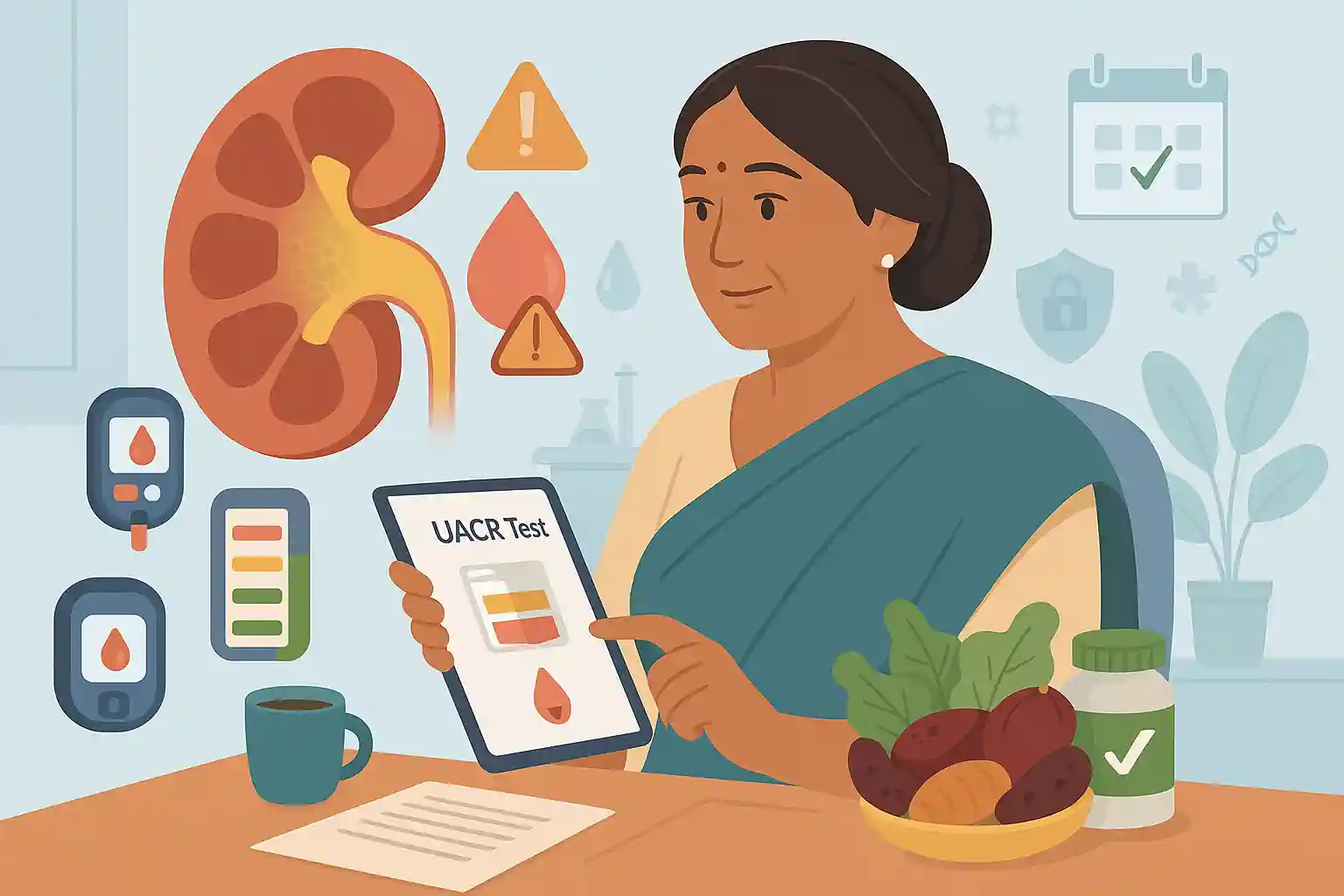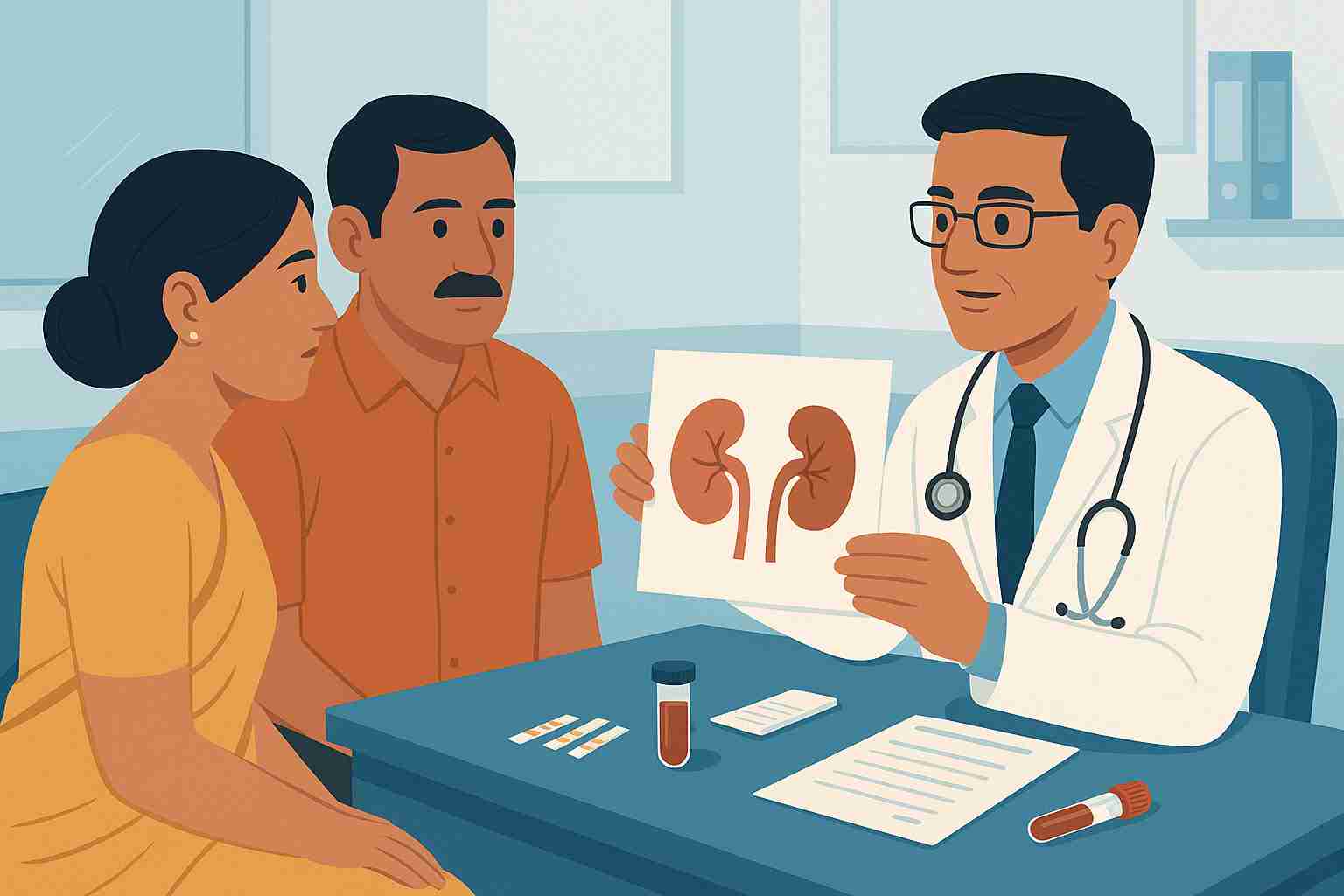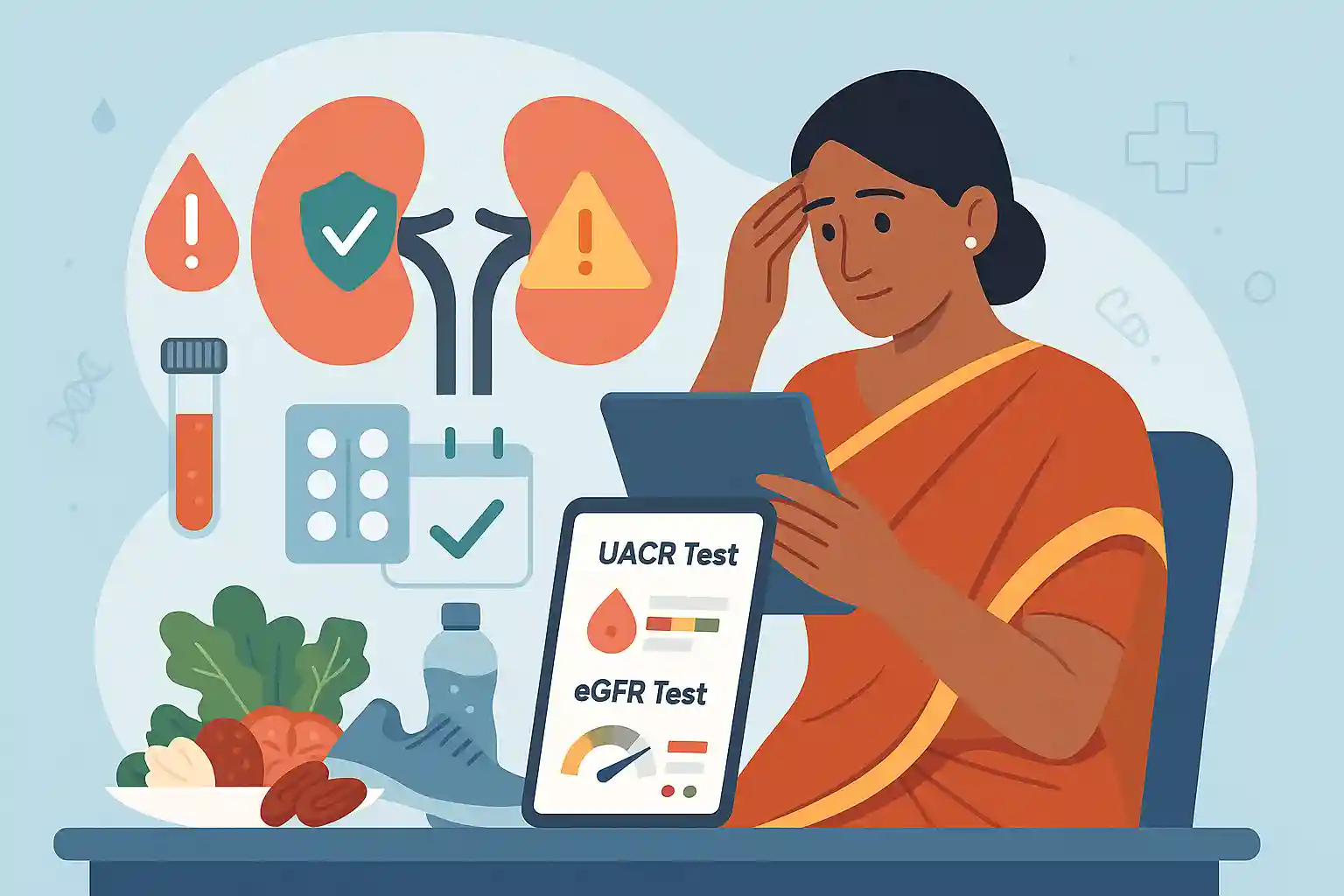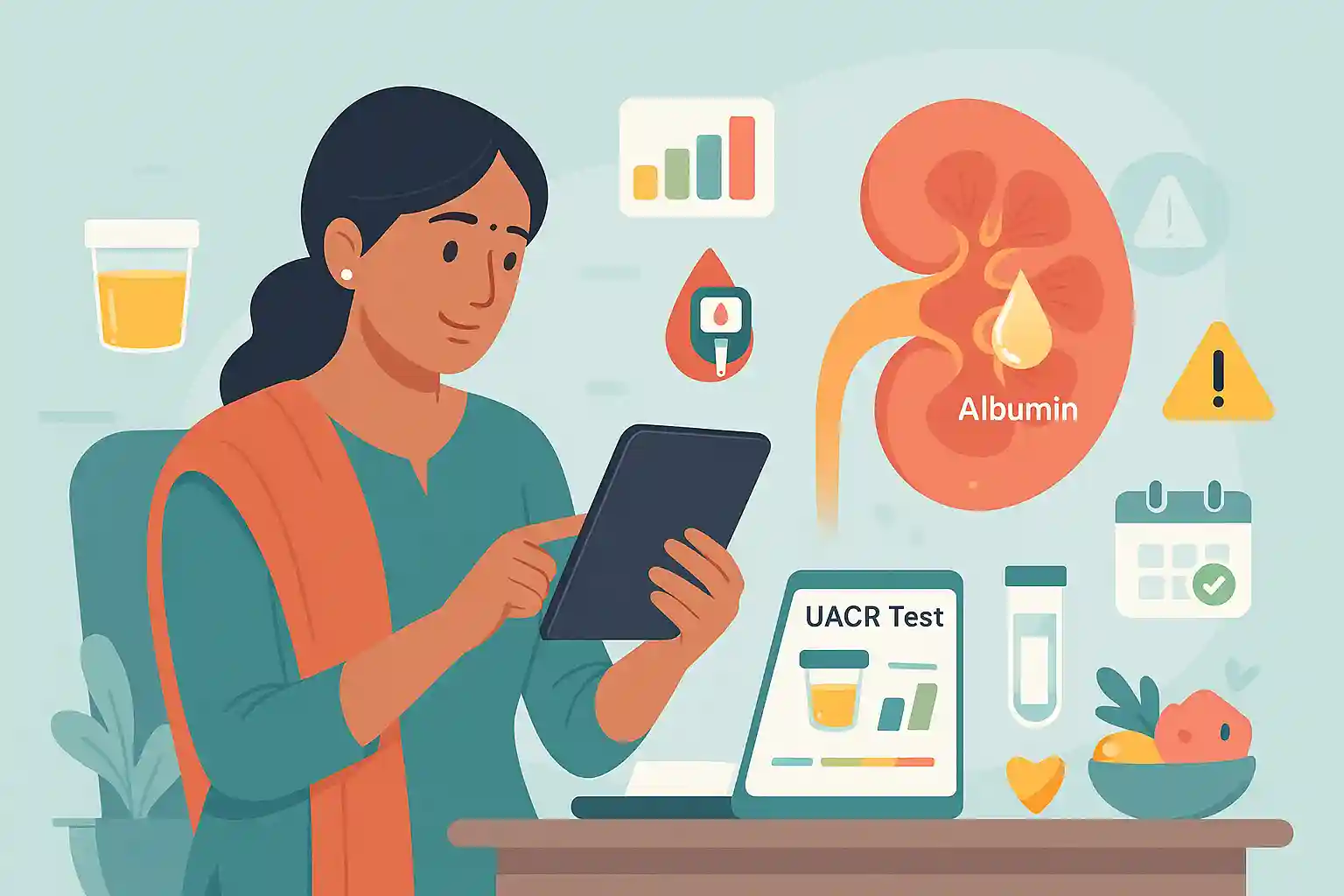Every year, thousands of Indian diabetics discover they need dialysis when it's too late to save their kidneys. The tragedy? A simple ₹200 urine test called UACR could have detected the problem years earlier. While most diabetics obsess over blood sugar levels, they ignore the silent killer that claims more diabetic lives than any other complication—kidney disease.
What is UACR Testing?
UACR (Urine Albumin-to-Creatinine Ratio) measures protein leakage in your urine—the earliest warning sign of kidney damage. When diabetes damages your kidneys, they start leaking albumin (protein) into urine long before you feel sick.
Understanding Your Results:
- Normal: Less than 30 mg/g (healthy kidneys)
- Early damage: 30-300 mg/g (still reversible)
- Advanced damage: Above 300 mg/g (urgent treatment needed)
- Kidney failure risk: Above 2000 mg/g
Why Indian Diabetics Are at Higher Risk
Indian diabetics face unique challenges that accelerate kidney damage:
- Poor blood sugar control: 70% have HbA1c above 7%
- High blood pressure: Often undiagnosed and untreated
- Genetic susceptibility: South Asians develop complications earlier
- Late diagnosis: Diabetes detected after complications begin
- High salt diet: Traditional foods increase blood pressure
- Limited access to specialist care in rural areas
Alarming Statistics:
- 40% of Indian diabetics develop kidney disease
- 50% don't know they have kidney problems until late stage
- Dialysis costs ₹3-6 lakh annually per patient
- Only 5% of those needing kidney transplant get one
When and How Often to Test
Testing Schedule:
- Type 1 diabetes: Start after 5 years, then annually
- Type 2 diabetes: Test immediately at diagnosis, then annually
- High risk patients: Every 6 months
- After abnormal results: Every 3 months
Test More Frequently If You Have:
- HbA1c above 7%
- High blood pressure
- Family history of kidney disease
- Diabetes for more than 10 years
- Age over 40
How to Get Accurate Results
Before the Test:
- Avoid vigorous exercise 24 hours before
- Don't test during fever or urinary infection
- Avoid excessive protein the night before
- Collect first morning urine sample
Test Costs in India:
- Private labs: ₹200-500
- Government hospitals: ₹50-150
- Home collection: ₹300-600
- Most insurance plans cover it
What Your Results Mean and What to Do
Normal Results (Below 30 mg/g):
- Keep HbA1c below 7%
- Maintain blood pressure under 130/80
- Continue healthy lifestyle
- Repeat test annually
Early Damage (30-300 mg/g) - Action Required:
- Target HbA1c below 6.5%
- Start ACE inhibitors or ARBs for blood pressure
- Limit protein to 0.8g per kg body weight
- Test every 6 months
- See nephrologist if available
Advanced Damage (Above 300 mg/g) - Urgent:
- Immediate nephrologist referral
- Aggressive blood pressure control
- Dietary protein restriction
- Monitor every 3 months
- Prepare for dialysis planning
Kidney Protection Strategies
Blood Sugar Control:
- Target HbA1c below 7% (6.5% if kidney damage present)
- Use continuous glucose monitoring if possible
- Take medications regularly
- Check blood sugar 4 times daily
Blood Pressure Management:
- Target below 130/80 mmHg
- ACE inhibitors or ARBs protect kidneys
- Reduce salt to less than 5g daily
- Monitor at home regularly
Lifestyle Changes:
- Stop smoking immediately
- Limit alcohol consumption
- Exercise 150 minutes weekly
- Maintain healthy weight
- Stay hydrated but don't overdrink
Kidney-Friendly Indian Diet
Foods to Include:
- Low-phosphorus proteins: Fish, chicken breast, egg whites
- Low-potassium vegetables: Cabbage, cauliflower, cucumber
- Whole grains in moderation: Brown rice, quinoa
- Healthy fats: Olive oil, nuts in small amounts
Foods to Limit:
- High-salt foods: Pickles, papad, processed foods
- High-potassium foods: Bananas, oranges, tomatoes
- Red meat and organ meats
- Dark cola drinks and alcohol
Medications That Protect Kidneys
First-Line Treatments:
- ACE inhibitors: Enalapril, Lisinopril (₹20-50/month)
- ARBs: Telmisartan, Losartan (₹50-150/month)
- SGLT2 inhibitors: Newer diabetes drugs with kidney benefits
- Diuretics: Help control fluid retention
Avoid These Medications:
- NSAIDs (Ibuprofen, Diclofenac) - damage kidneys
- Herbal remedies without doctor approval
- Ayurvedic medicines with heavy metals
- Over-the-counter pain relievers regularly
Healthcare Access in India
Government Support:
- Ayushman Bharat: Covers dialysis and transplant up to ₹5 lakh
- State schemes: Additional support varies by state
- Primary Health Centers: Basic kidney function tests
- District hospitals: Nephrology services in some locations
Building Your Care Team:
- Diabetologist: For blood sugar management
- Nephrologist: Kidney specialist (if available)
- Dietitian: Kidney-friendly meal planning
- Pharmacist: Medication counseling
Warning Signs - Seek Immediate Help
Go to hospital immediately if you have:
- Sudden swelling in face, hands, or feet
- Foamy or bloody urine
- Severe nausea and vomiting
- Difficulty breathing
- Persistent fatigue and weakness
- Decreased urination or difficulty urinating
Technology Tools for Monitoring
Helpful Apps and Devices:
- Blood pressure monitors for home use
- Smartphone apps for tracking medications
- Digital glucometers with data sharing
- Telemedicine for regular consultations
- Kidney health tracking apps
Your Action Plan
This Week:
- Schedule UACR test immediately
- Check your last HbA1c result
- Measure blood pressure at home or pharmacy
- List all medications you're taking
This Month:
- Get complete kidney function panel done
- Consult doctor about results and treatment plan
- Start kidney-protective medications if recommended
- Begin dietary modifications
Ongoing:
- Monitor blood sugar and pressure daily
- Take medications consistently
- Follow up with UACR testing as scheduled
- Maintain healthy lifestyle habits
The Bottom Line
UACR testing is your early warning system for kidney problems. A ₹200 test today can save you from ₹5 lakh dialysis costs tomorrow. With early detection and proper treatment, you can prevent or slow kidney disease progression significantly.
Don't wait for symptoms—kidney disease is silent until it's severe. If you're diabetic, get UACR tested now and annually thereafter. Your kidneys can't regenerate, but they can be protected with the right actions taken at the right time.
Take control of your kidney health today. Schedule that UACR test, optimize your blood sugar and blood pressure, and work with your healthcare team. Your future self will thank you for the proactive steps you take now.



